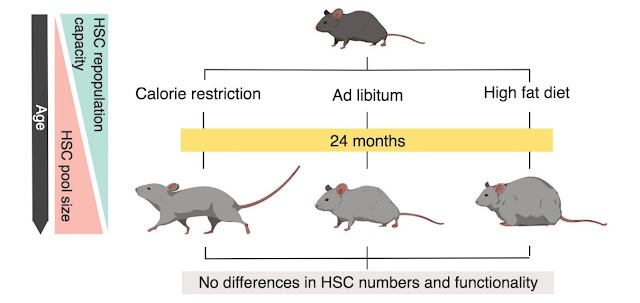Exploring Experimental Hematology: September 2017 (Volume 53)
Exploring Experimental Hematology: Salad or Burger for Dinner? Your Stem Cells Don't Really Care.
In this issue of Simply Blood, Evgenia Verovskaya is Exploring Experimental Hematology and highlighting and deconstructing one of her favorite manuscripts from the ISEH society journal: "Lifelong dietary intervention does not affect hematopoietic stem cell function" by Seka Lazare et al.
Across the planet, people are living longer and longer. Can we influence how healthy we age? Many studies of organismal aging indicate that healthy diet and exercise can reduce age-related morbidities. But working in the field of blood research, the question is – can dietary choices also prevent aging of hematopoietic stem cells (HSCs), and rejuvenate blood production in the elderly? The group of Gerald de Haan addressed this question using the mouse model and published their interesting findings in Experimental Hematology.
What to expect in this paper:
The de Haan group examined HSC function in C57/BL6 mice fed a high fat, low fat, or calorie-restricted diet throughout their whole life. As expected, the weight of the mice on different diets was very different. But what happened to their HSCs?
There are several well-established phenotypes that are associated with HSC aging: 1) the HSC pool dramatically expands with age, 2) aging leads to decreased repopulation capacity of transplanted HSCs, and 3) aged HSCs display myeloid bias upon transplantation, just to name a few. When Lazare et al. assessed numbers and functionality of HSCs in different study branches using these signs of aging as their output, they came to surprising conclusions.
Reasons you should read this paper:
Why is this straightforward study so interesting and important? Well, calorie restriction is currently considered one of the most promising anti-aging interventions, that has been intensively studies in many model organisms including non-human primates. Recently, beneficial effect of calorie restriction was confirmed in humans. While the regimen is improving the function of many different organs, this Experimental Hematology paper demonstrates that the HSCs are indifferent to life-long calorie intake, and will demand a distinct treatment to slow down their aging.
On the optimistic side, I don’t have to skip my favorite midday pastry – my HSCs are ok with my choice.
To read this whole exciting paper, go to:
https://www.exphem.org/article/S0301-472X(17)30232-1/fulltext?utm_campaign=STMJ_1546851035_SC&utm_medium=WEB&utm_source=WEB&dgcid=STMJ_1546851035_SC
Evgenia Verovskaya
ISEH Publications Committee Member
Post-doctoral Fellow
Passegué Lab
Columbia University Medical Center
New York, NY, USA
http://passeguelab.ucsf.edu/
Across the planet, people are living longer and longer. Can we influence how healthy we age? Many studies of organismal aging indicate that healthy diet and exercise can reduce age-related morbidities. But working in the field of blood research, the question is – can dietary choices also prevent aging of hematopoietic stem cells (HSCs), and rejuvenate blood production in the elderly? The group of Gerald de Haan addressed this question using the mouse model and published their interesting findings in Experimental Hematology.
What to expect in this paper:
The de Haan group examined HSC function in C57/BL6 mice fed a high fat, low fat, or calorie-restricted diet throughout their whole life. As expected, the weight of the mice on different diets was very different. But what happened to their HSCs?
There are several well-established phenotypes that are associated with HSC aging: 1) the HSC pool dramatically expands with age, 2) aging leads to decreased repopulation capacity of transplanted HSCs, and 3) aged HSCs display myeloid bias upon transplantation, just to name a few. When Lazare et al. assessed numbers and functionality of HSCs in different study branches using these signs of aging as their output, they came to surprising conclusions.
- Age-related expansion of the HSC pool was not prevented by calorie restriction nor accelerated by high fat diet.
- Functional deterioration of the HSC pool with age was not affected by life-long dietary differences.
Reasons you should read this paper:
Why is this straightforward study so interesting and important? Well, calorie restriction is currently considered one of the most promising anti-aging interventions, that has been intensively studies in many model organisms including non-human primates. Recently, beneficial effect of calorie restriction was confirmed in humans. While the regimen is improving the function of many different organs, this Experimental Hematology paper demonstrates that the HSCs are indifferent to life-long calorie intake, and will demand a distinct treatment to slow down their aging.
On the optimistic side, I don’t have to skip my favorite midday pastry – my HSCs are ok with my choice.
To read this whole exciting paper, go to:
https://www.exphem.org/article/S0301-472X(17)30232-1/fulltext?utm_campaign=STMJ_1546851035_SC&utm_medium=WEB&utm_source=WEB&dgcid=STMJ_1546851035_SC
Evgenia Verovskaya
ISEH Publications Committee Member
Post-doctoral Fellow
Passegué Lab
Columbia University Medical Center
New York, NY, USA
http://passeguelab.ucsf.edu/



.png)


Comments
Post a Comment